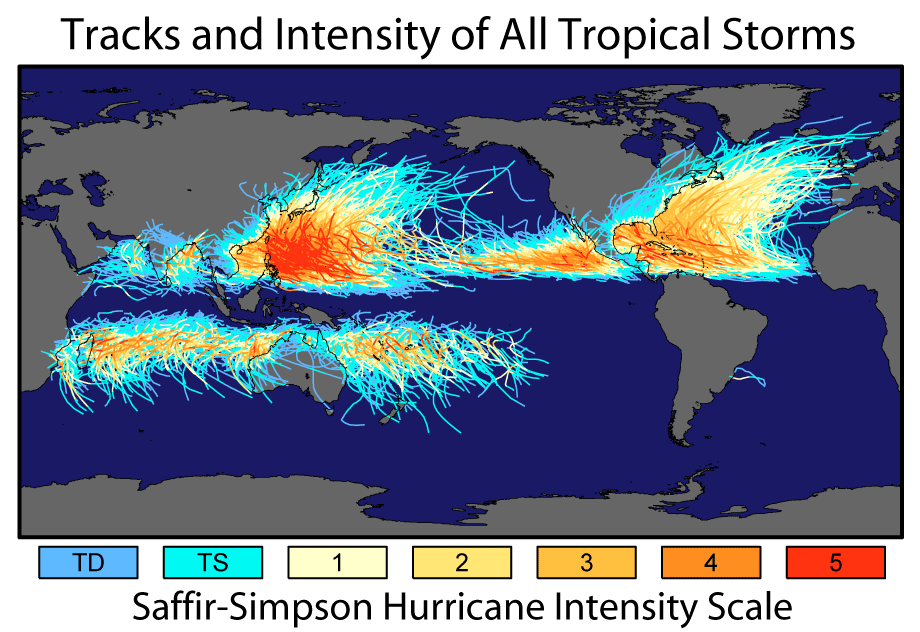Deltas are one of the nicest coastal features to spot from the air, especially when viewing a false colour satellite image as below. This is the Lena delta, where the Lena river discharges in the Black Sea.

Tuesday, 12 March 2013
Wednesday, 20 February 2013
Scanning coastal cliffs
 One of my PhD students, Claire Earlie, is making very high resolution scans of several coastal cliff sites in Cornwall to see how the morphology changes over time. The plot below shows an example of such scan, and the picture to the right shows a photo of the scanned region (compare the fallen down gate near the top of the cliff). By re-scanning the cliff section after a few months, she can exactly determine how much of the cliff has been lost. Next step will be to link such changes to wave and westher conditions.
One of my PhD students, Claire Earlie, is making very high resolution scans of several coastal cliff sites in Cornwall to see how the morphology changes over time. The plot below shows an example of such scan, and the picture to the right shows a photo of the scanned region (compare the fallen down gate near the top of the cliff). By re-scanning the cliff section after a few months, she can exactly determine how much of the cliff has been lost. Next step will be to link such changes to wave and westher conditions.Monday, 11 February 2013
Storm survey Sellafield
 Sorry for being off-line for a while and not in the lecture room, but I have been away for a storm survey as part of a project to investigate the long-term future of the UK coastal energy supply. You may know that the UK relies quite heavily on nuclear power for their electricity requirements, and all nuclear power stations are on the coast. After the tsunami-damage to a Japanese nuclear power station a few years ago people in the UK started to worry about their coastal nuclear power stations and the project we are involved with is concerned with determining how vulnerable the locations of the nuclear power station are to factors such as storms, sea-level rise and coastal erosion. Our contribution to the prject is relatively small: our objective is to measure the coastal response to a storm at 4-5 nuclear power station sites and pass the oinformation on to numerical modellers. Last week we measured a storm at Sellafield.
Sorry for being off-line for a while and not in the lecture room, but I have been away for a storm survey as part of a project to investigate the long-term future of the UK coastal energy supply. You may know that the UK relies quite heavily on nuclear power for their electricity requirements, and all nuclear power stations are on the coast. After the tsunami-damage to a Japanese nuclear power station a few years ago people in the UK started to worry about their coastal nuclear power stations and the project we are involved with is concerned with determining how vulnerable the locations of the nuclear power station are to factors such as storms, sea-level rise and coastal erosion. Our contribution to the prject is relatively small: our objective is to measure the coastal response to a storm at 4-5 nuclear power station sites and pass the oinformation on to numerical modellers. Last week we measured a storm at Sellafield.  Interestingly, despite energic waves and spring tide conditions, the beach was remarcably stable with only limited change recorded. At Sellafield, the low tide beach is low-gradient and sandy, and hence very dissipative, whereas the high tide beach is steep and gravelly, and hence very reflective. One could suggest that this is the perfect combination for a very stable beach: the sandy flat will dissipate most of the wave energy, and the little bit of energy that makes it across the flat will be absorbed and reflected by the gravel beach.
Interestingly, despite energic waves and spring tide conditions, the beach was remarcably stable with only limited change recorded. At Sellafield, the low tide beach is low-gradient and sandy, and hence very dissipative, whereas the high tide beach is steep and gravelly, and hence very reflective. One could suggest that this is the perfect combination for a very stable beach: the sandy flat will dissipate most of the wave energy, and the little bit of energy that makes it across the flat will be absorbed and reflected by the gravel beach. Wednesday, 16 January 2013
Transgressive dunes
I mentioned at the end of last week's lecture the formation of transgressive dunes, which are large unvegetated coastal dunes that migrate landward. They widely occur in Australia, and were also common along the French Atlantic coast, until Napoleon planted pine trees to fix them (this area is known as 'Les Landes'). Some of these French Atlantic coast transgressive dunes, however, remained and the best example is Pyla dune just south of the Arcachon Inlet near Bordeaux. For more information see: http://unbelievableinfo.blogspot.co.uk/2012/07/great-dune-of-pyla-sahara-of-france.html.
Friday, 11 January 2013
Tropical cyclone map
I am reading up on tropical cyclones for a review paper on effect of extreme storms on shorelines and came across this fantastic picture showing 150 year of cylone tracks. Couldn't resist! The cyclone tracks are subdivided into tropical depressions, tropical storms and hurricanes (Category 1-5), reflecting increasing intensity. Why do you think there are no hurricanes around the equator? Also, note the lone tropical storm along the coast of Brasil. For more information click this link.
Monday, 7 January 2013
Rip currents on beaches
Welcome back and happy new Year. Next lecture is on beaches and we will spend a little bit of time talking about rip currents. Have a look at the following two utube clips to get excited: Dr Rip's clip and BBC Bang Goes the Theory.
Subscribe to:
Comments (Atom)




